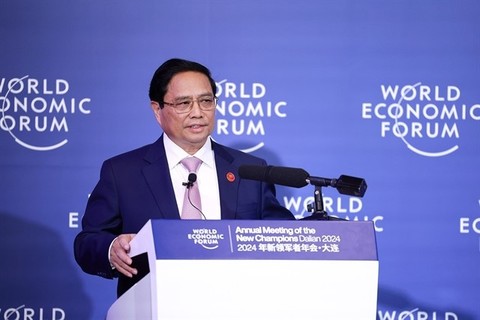
Prime Minister Phạm Minh Chính at the talks with major economic corporations of the World Economic Forum (WEF) held in in Dalian city on June 26. — VNA/VNS Photo
At the talks between Prime Minister Phạm Minh Chính and major economic corporations of the World Economic Forum (WEF), the businesses highly appreciated Việt Nam's economic growth and improved investment and business environment, especially the digital economy.
On the occasion of attending the WEF Annual Meeting of the Champions in Dalian City, Liaoning Province of China, Prime Minister Phạm Minh Chính and Professor Klaus Schwab, WEF founder and chairman, co-chaired the dialogue with about 20 leaders of WEF's major economic corporations held in Dalian city on June 26.
The dialogue discussed strengthening cooperation to promote Việt Nam's economic growth and focusing on digital transformation, high technology, green transformation and Việt Nam's role in the global supply chain.
The delegates talked in a spirit of openness, sincerity and frankness, looking forward to new opportunities for cooperation in the future.
Brand Cheng, Foxconn chairman and CEO, told the Prime Minister about the additional factory in Việt Nam that went into production last April.
So far, Foxconn has its factories in Việt Nam's five provinces with 80,000 employees and a total investment of about US$4 billion.
Cheng said Việt Nam is developing rapidly and Foxconn is growing with Việt Nam.
A representative of Pepsico said that after 30 years, the company has invested $850 million in Việt Nam and it will continue to increase investment here, especially in the fields of agriculture and food processing and plastic recycling, along with promoting support for small businesses.
At the meeting, the delegates also expressed interest in a number of issues, such as completing regulations and policies related to the digital economy and green transformation. These include electronic signatures in the digital economy, banking and finance sector, green certificates, ensuring electricity supply and energy conversion, financing for renewable energy, and preferential policies for the high-tech field.
Prime Minister Chính said that the consequences of the COVID-19 pandemic and factors, such as political tension, conflict, competition and climate change, continue to affect the world economy and countries.
In that context, Việt Nam prioritises economic growth while taking measures to control inflation, stabilise the macro-economy, and ensure major economic balances.
As a result, Việt Nam's GDP growth reached 8.02 per cent in 2022, 5.5 per cent in 2023 and 5.66 per cent in the first quarter of 2024. The GDP growth rate in the second quarter is estimated to be higher than the first quarter and continue towards the higher end by the end of the year.
Việt Nam’s macroeconomic situation has remained stable, inflation has been controlled and major balances have been maintained in the first quarter of this year.
Public debt, Government debt and foreign debt are much lower than permissible limits. The Vietnamese currency is still in the group with the least devaluation compared to other countries in the region.
In the future, Việt Nam will continue to prioritise economic growth, renew traditional growth drivers and strongly promote new growth drivers, with priority areas being green, digital, circular and sharing economies which are a growing trend in the world, Chính said.
The Prime Minister asked investors to continue to accompany Việt Nam in implementing the goal of promoting economic growth associated with maintaining macroeconomic stability and controlling inflation.
Việt Nam will continue maintaining political stability, social order and safety to develop the economy, ensure the legitimate rights and interests of investors, promote the reduction and simplification of administrative procedures and further improve the investment environment.
Regarding electricity supply, the Prime Minister affirmed that Việt Nam will not lack electricity thanks to synchronous solutions on power source, electricity load, distribution, electricity use and electricity price.
Along with that, Việt Nam is making efforts to transition to clean energy, so the Government continues to improve mechanisms and policies to encourage the development of rooftop solar power and power projects using natural gas and liquefied natural gas.
The Government is about to issue a decree related to implementing the global minimum tax and amending the investment incentive policies on tax, finance, cost and land for projects.
Meanwhile, Việt Nam will prioritise investment in projects in emerging fields, projects using high technology, projects promoting digital transformation and green transformations, along with projects developing strategic fields such as semiconductors and artificial intelligence.
The Prime Minister requested that WEF and its partners strengthen cooperation with Việt Nam in consulting and providing suggestions for the development and planning of policies and to create conditions for Việt Nam to participate in WEF initiatives and ecosystems.
WEF and its partners continue to promote their important role as a bridge in supporting and encouraging businesses and investors to seek cooperation and investment opportunities, contributing to the rapid and sustainable development of Vietnam's economy. — VNS